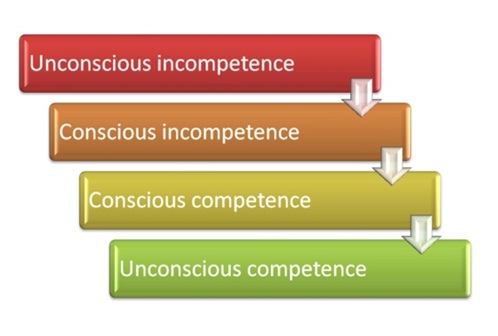Stephen Walker compares the demands of learning delivery with the quirks of technologies, in use now and in the future. He points out that commercial viability is a key driver and all possible learning delivery mechanisms are not viable today.
The future of learning encompasses three factors: the nature of learning; technology; people.
Learning can be looked at as a four-stage process.

In the begining we are unaware of what we don't know. When we learn a little about the subject we become aware that there is much we do not know. Through learning or training we come to be competent in the subject. The final stage is when we acquire the behaviours that allow us to use our new knowledge and abilities without thinking. The knowledge has become intrinsic and our behaviour automatic. Learning to drive a car is an obvious example.
 "Technological advances are hard to forecast but usually slower than expected. Although, one should never completely discount unexpected scientific breakthroughs."
"Technological advances are hard to forecast but usually slower than expected. Although, one should never completely discount unexpected scientific breakthroughs."We should ponder if this learning model will be relevant in 2025. Will we still need to know things unconsciously or will it be better to know how to quickly find out what to do and how to do it? I'm a school governor and our long term vision for the (primary) school includes giving our children the ability to learn the skills for the jobs they will do in 2060. I would wager that 90% of those jobs will have titles that are unknown, and unknowable, to us today.
Technological advances are hard to forecast but usually slower than expected. Although, writing this at a time when the Theory of Relativity is being challenged by CERN's neutrino experiments, one should never completely discount unexpected scientific breakthroughs. My future gazing is limited to the nearly technically possible assuming better processes and advanced understanding will deliver commercially viable learning platforms.
How will people develop over the coming years? Humans do not change much in tens of years. Thousands of years are needed for evolution to develop adaptions to the environment.
Technology may provide enhancements. Why use a mobile phone to talk, look up data and take pictures when all that is needed is an implanted chip and a splice onto neural paths... I guess these are patented already.
Conference calls
Teleconferencing technology has been widely used. Teleconferencing has three distinct drawbacks to set against the time and money saved by avoiding travel.
First they deny participants feedback, the visual cues, that we use to know when someone wants to speak. The cues help manage the flow of an ordinary face-to-face discussion. People can see how desperate you are to contribute and how you feel now – someone may just have made your point. The lack of visual cues makes teleconferencing very cumbersome. People talk over each other, then go silent and wait, leading to the discussion stalling.
Then there is the ever present danger of a loss of focus. People sit at face-to-face meetings and play with their phones checking emails and responding. They will do this during teleconferencing and not be involved in the discussion.
Online resources
Some things can be learnt online. Twenty years ago I needed to lay a hedge to make it animal-proof. I found a website that showed me what to do, how to cut the trunks at an angle and bend them to lie in the same direction. This thickens and lowers the hedge. It worked perfectly with just one error that made the trunk snap.
This information was very useful and I could use my pre-existing handicraft skills to put the information to use. The website provided step by step instructions based upon a lot of experience. I do not think I would attempt a self-appendectomy as I have no medical skill no matter how good the online guide was in instruction.
For me, attempting to follow online cooking instructions would be disastrous. I can see that for someone with culinary skills, on-line recipes and process descriptions, can be very useful.
Loss of concentration
I have touched on distractions, mobile phones, and the genuine puzzlement that we all know about. We come across these in our face-to-face training. A good trainer will look for the symptoms and have natural tiredness breaks built into the session. We all know to avoid stand-up delivery in that post-lunch session when some delegate participation will at least keep them awake. At least face-to-face you can spot the impending carbohydrate-fuelled slumber. If you are delivering remotely how would you know?
Technology needs to provide a solution. What is the 21st century equivalent of the sloping seat used in the Middle Ages to keep meditating monks awake?
"The use of video and voice-overs can explain much more complicated subjects more thoroughly. The uses of video training modules are broad."
Online resources can be dipped into to suit the learner which should at least mean he or she is awake.
Webinars
Webinars can be an extremely valuable enhancement of online learning resources. The use of video and voice-overs can explain much more complicated subjects more thoroughly. The uses of video training modules are broad. What better way to provide complex process instructions: from fixing a leaking tap to emergency resuscitation.
Technology has provided the means for us all to create webinars now at practically zero cost. I watched one last week that was stuffed with bad presentation examples. If you are going to create webinars yourself you must achieve professional results.
Part two will be published next week.
Stephen is a co-founder of Motivation Matters, set up in 2004 to develop the management of motivation to inspire greater performance. A published author of articles and Conference speaker, Stephen delivers workshops on “doing more with less” across the country. It is all about making people WANT to work, he says. You can follow Stephen on LinkedIn, Twitter, Facebook, YouTube and blog









